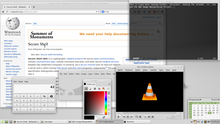بەرنامەی خۆڕایی و سەرچاوەکراوە
ڕواڵەت

بەرنامەی خۆڕایی و سەرچاوەکراوە (FOSS) ھەموو ئەو بەرنامانە دەگرێتەوە کە خۆڕاییە و سەرچاوەکراوەن[ئ] ھەموو کەسێک دەتوانێت بە مۆڵەتی خۆڕایی بەکاریان بھێنێت بۆ مەبەستی خوێندن و فێربوون، یان گۆڕانکاری تێدا بکات بەھەر جۆرێک خۆی بییەوێ.
تێبینییەکان
[دەستکاری]- ^ FOSS is an inclusive term that covers both free software and open-source software, which despite describing similar development models, have differing cultures and philosophies.[١] Free refers to the users' freedom to copy and re-use the software. The Free Software Foundation, an organization that advocates the free software model, suggests that to understand the concept, one should "think of free as in free speech, not as in free beer". (See «The Free Software Definition». GNU.org. لە ٤ی شوباتی ٢٠١٠ ھێنراوە.) Free software focuses on the fundamental freedoms it gives to users, whereas open source software focuses on the perceived strengths of its peer-to-peer development model.[٢] FOSS is a term that can be used without particular bias towards either political approach.
سەرچاوەکان
[دەستکاری]- ^ Feller 2005, pp. 89, 362.
- ^ Feller 2005, pp. 101–106, 110–111.
| ئەم «کۆمپیوتەر» وتارە کۆلکەیەکە. دەتوانیت بە فراوانکردنی یارمەتیی ویکیپیدیا بدەیت. |
